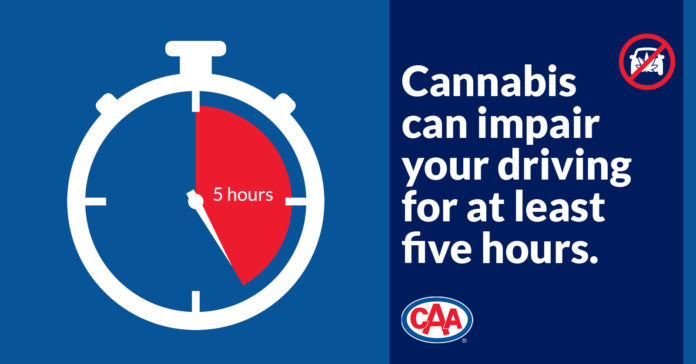Canadians are worried about an increase in cannabis-related driving as the New Year approaches, according to a new poll released Dec. 27 by the Canadian Automobile Association (CAA).
Nearly three quarters (73 per cent) of those polled said they believe there will be an increase in cannabis-impaired driving over the holiday party season.
The same poll suggested they may have good reason to worry – while nine in ten young Canadians (89 per cent) said they wouldn’t drive themselves home after drinking, the number plummeted to only 66 per cent among those planning to consume cannabis/In other words, a third would be willing to drive themselves home after consuming cannabis.
“We know young Canadians are those most likely to think they can drive as well or better when they’re high as when they’re sober,” says Jeff Walker, CAA chief strategy officer. “Scientific studies show that’s not true, but findings like these demonstrate there is a need for more education. If you plan to consume cannabis, don’t drive. Make an alternate arrangement just like you would for drinking.”
Walker added: “Public education remains the key to keeping everyone safe on the roads post-legalization. Cannabis may impair your driving differently than alcohol, but the effect is the same – decreased reaction times that can lead to collisions and even fatalities.”
The numbers were better, “but not reassuring,” among Canadians as a whole, according to a CAA release, which said “while 92 per cent of Canadians said they would plan for alternative travel arrangements like a ridesharing service, taxi or a designated driver after drinking alcohol, only 77 per cent said they would do the same for cannabis.”
“Not only are young Canadians (those aged 18 to 34) the most likely to think their driving is unaffected by cannabis, about a third (30 per cent) say they have either driven after smoking cannabis or been in an automobile driven by someone who had recently smoked cannabis,” CAA noted in a release.
CAA says it is “committed to doing its part by running regular public education campaigns, funding studies on the effect of cannabis on driving, and working with government to ensure law enforcement is properly funded to deal with cannabis-impaired driving.”
A 2018 McGill University study, funded by CAA, suggested the driving performance of young Canadians declined significantly, in key areas such as reaction time, even five hours after inhaling the equivalent of less than one typical joint.
Findings are based on a CAA poll of 2,006 Canadians carried out in December 2018. A probability sample of the same size would yield a margin of error of +/-2.2%, 19 times out of 20.



















